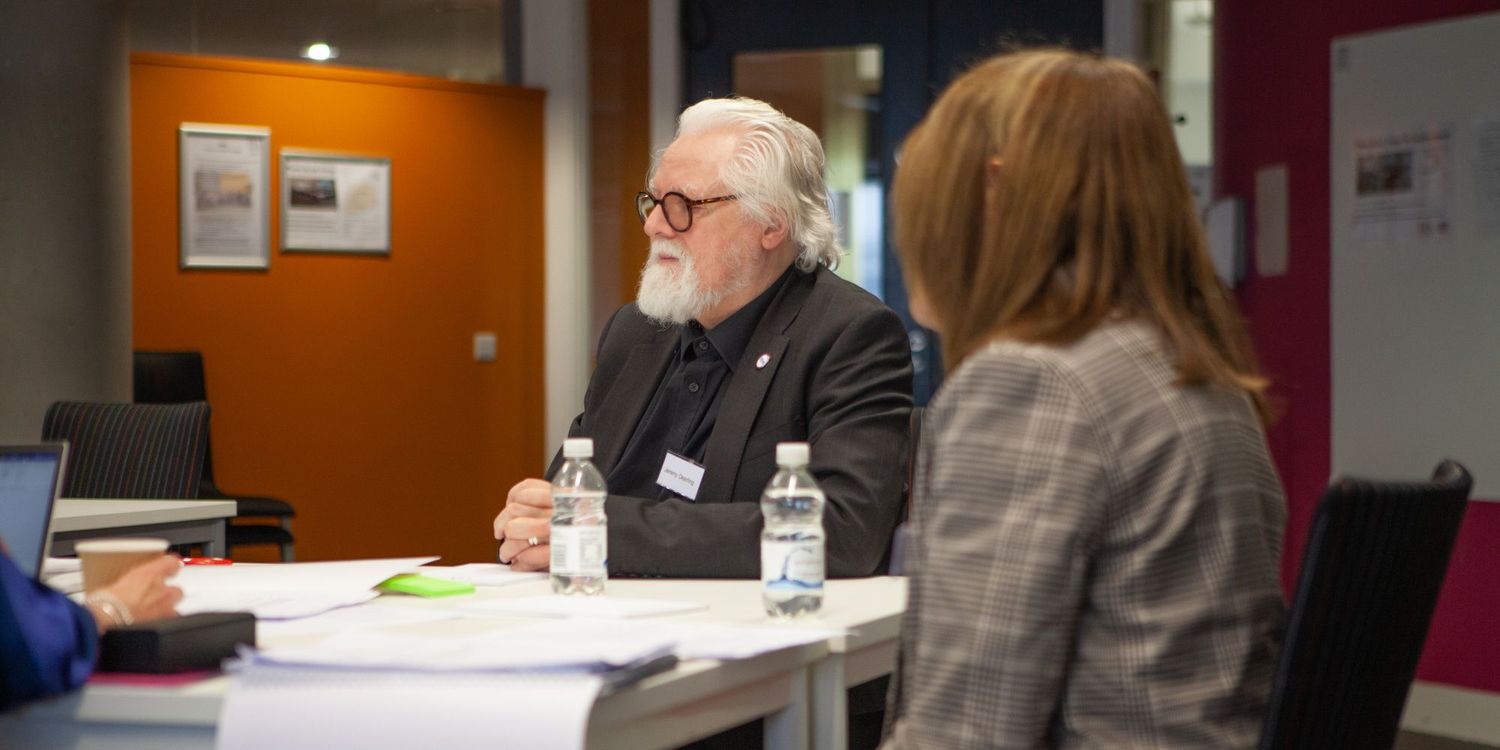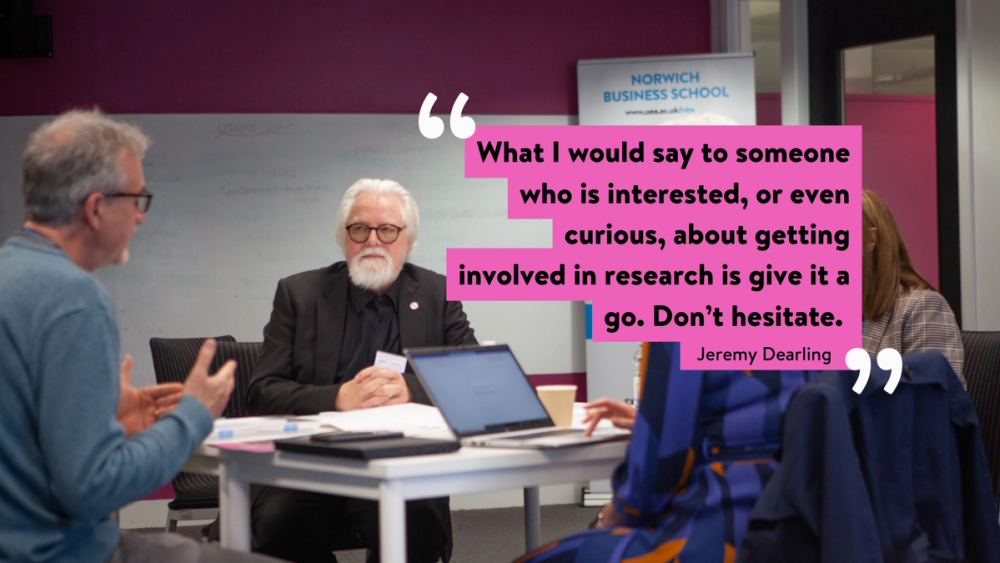26 Oct 2023
Feel free get in touch with us via email or social media.
© UEA. All rights reserved. University of East Anglia, Norwich Research Park, Norwich, Norfolk, NR4 7TJ, UK
Citizen-led Research and its Importance: an Interview with Jeremy Dearling

Our next Research Sandpit event will take place on the 15th of November, at the New Sciences Building on the UEA campus. You can register your interest for the event by clicking here.
Research Sandpits supply the opportunity for researchers, partners, clinicians, and Patient and Public Involvement (PPI) participants to network and share ideas to help shape them into practice-led research projects.
In preparation for our next event, we wanted to look back on our April Research Sandpit, where we spoke to Jeremy Dearling on the importance of citizen-led research and collaboration.
Jeremy has been involved in supporting research at all stages of the research cycle for many years. He began his work in the field of PPI following a life changing critical illness.
He has a plethora of experience including being a key member of research studies as a PPI representative, reviewing funding applications, and contributing to teaching and learning.
How have you found the Research Sandpit so far?
The first Sandpit I did last year was really interesting, I enjoyed that enormously because it is what it is, you are throwing ideas around, trying to explore where the gaps in knowledge are, where the gaps in opportunities are.
Today's Sandpit was focused specifically on a particular clinician. He's an anaesthetist who has this wonderful hypothesis that, as far as he can determine, nobody has explored previously and he's not been able to get anywhere in terms of getting any enthusiasm from colleagues, not being able to identify any funding sources, so what we've been trying to do is help him focus his ideas and we've narrowed it down to building up a team and getting people on board who are going to influence others.
It's more than just a simple case of applying for a funding stream and going for it because the funding streams rely upon people who are satisfied that his ideas have not just got hypothetical merit, but has got the potential and approval of colleagues who have got that speciality, and as he's an anaesthetist and not an endocrinologist, he needs the endocrinology backup to give weight to what he's doing.
Why do you think it's valuable to conduct research in a collaborative way?
It's vital because otherwise research never gets done. Research is highly dependent on all sorts of different streams of knowledge. You can't prove a hypothesis with one particular skill, you need the skills of a body of people, you need not just the principal clinician or academic. But in order to persuade other people, because once the research is done, that has got to be published to influence others, and for others to be influenced, they need to be satisfied that the whole process of the research, the project, has been thoroughly met.
That means the economic case has got to be satisfied, so you're looking at including a health climate, the statistics have got to weigh up, and a clinician or an academic do not have the single skills that are necessary in a research project, so you've got to have a statistician, you sometimes have to get a sociologist onboard, a behaviour change expert, conversational analyst, and last but not least you've got to have a member of the public who can persuade the team that the patient burden of the research proposal is acceptable. There are a number of occasions whereby I've been involved in a research project where the burdens of the patient or their care has been such that I think "This is not going to work".
The other aspect of team membership and collaborative work is you've got to have somebody who knows what its like to work in the NHS, that frontline level. I've got the advantage that I used to be a Staff Nurse, I can look at the research proposal and say "This is all well and good, but if you're expecting a Staff Nurse to do this on top of their ordinary job, you've got another thing coming!"
So, collaborative working in a research environment is absolutely vital because research doesn't work otherwise.
As a citizen, why do you feel its so important to be involved in research and what do you enjoy?
It's intellectually satisfying, but more than that it's important for the public to be involved in the research conversation, because it makes the whole thing democratic and transparent. It's all very well for research to go on behind closed corridors but unless the public are involved in those conversations, the accountability, such as "Is this research a good use of public money?" - is lost. So, it really is very, very important.
How do you think researchers can better engage with the public to involve them more with the research process?
It's not difficult for a researcher to engage the public in the research process. It just takes a little bit of imagination and effort. There are research patient panels all over the country. There are organisations like People in Research and The Voice, all of which act as a focus point by where the public can put their availability to researchers, and researchers can pick up contacts of people who they want to invite to the research conversation.
Getting people to become involved in research does take some effort, because some of them need a lot more support than others. They need to be able to understand the language that's used, and clinicians and academics are not good at explaining things in plain English.
Very often when I'm reviewing, I come across the use of the word 'protein' in a patient-facing document, or in any patient-facing material, and to the academic and researcher, the clinical context or the research context, the word protein has a specific meaning. Unless you've got an A-level in Human Biology, you don't know what that word means. To most people, the word protein is a word associated with either chips or gravy. So, it's important that the public are there to pick up on these things and get the academics and clinicians to think about the language that they are using.
What would you say to someone interested in getting involved in research?
What I would say to someone who is interested, or even curious, about getting involved in research is give it a go. Don't hesitate.
There are people just like you who have been doing it for years who were exactly where you are now, they didn't know if it would work for them. But it does work for them.
And there are people like me who are around who will help people to become involved in the research conversation. We can buddy, we can explain things, there are jargon busters out there. There are all sorts of things, all sorts of training opportunities to help people become involved in research who have never done it before, and we need these people who are just coming off the streets, standing at the bus stops, sitting in waiting rooms, to be part and parcel of the research conversation, because having the public patients involved in all stages of the research cycle, whether you're a child, a teenager, somebodt in their working career, somebody who is retired, we've all got something to bring to the research conversation and I would encourage anybody to do it.

As a citizen, is there a particular study or project you were involved in that you are most proud of?
I've been involved in research since 2012, and all of the studies I've been involved in, there are some that stand out, and some that do not stand out quite so far.
It's not so much the projects themselves, but the teams. One of the things I am particularly proud of, I was recruited to Cancer Research UK: The Grand Challenge panel, and this is a panel that had academics and clinicians who'd gotten really bonkers ideas, who will never get funding from the traditional streams, will approach Cancer Research UK saying: "Will you give me the money to do this?"
So that was one particular thing I enjoyed.
I'm also involved in a team at the moment, where I've been doing something which is new to my experiences in PPI, which is a podcast. The study is headed by Angus Ramsay and the team is called PHOTONIC, and it's a study about looking at the merits of pre-hospital video triage for stroke patients.
A paramedic is sent out to a suspected stroke victim, and using video technology, the paramedic will communicate with the stroke physician or stroke centre and together they will triage the patient. So, the triage will happen at the patient's bedside instead of being in the hospital, and doing a podcast whereby we are interviewing every member of the team to help them, to get them to explain their role in the study, and to explain their role generally, it is a wonderful way of getting people informed.
I would encourage any research project to use the potential of podcasts to disseminate, or be part of their dissemination, to share the learning that is taking place.
I've been involved in all kinds of studies. I love them all. I'm enthused by all of them. It's absolutely wonderful and stimulating, marvellous stuff, and I wish I could do more.
If you are interested in getting involved in PPI research and collaboration, you can contact the Citizens Academy.
Related News & Events
No results, please try changing the filters
Stay up to date
Subscribe to our newsletter to receive news on the latest updates and projects in health and social care research.